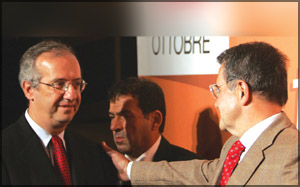Info 'n' Activity corner
'Verbal traffic jams':
A crazy experience
Babbling
along mid-sentence, you are suddenly struck silent, throttled by a
dumbfounding inability to come up with the next word. The thing appears
lost somewhere in the gray space between your ears.
This is it, you think. My brain has outlived its warranty. But the
aggravating phenomenon is quite common - common enough to have a name;
tip-of-the-tongue experience, or TOT. It is the inability to retrieve a
word from memory, twinned with an uncanny sense of knowing that you know
the word.
 Studies
suggest that the brain retrieves words through a system of networks that
process thoughts into speech; the TOT occurs when a snag blocks the word
from making it to the articulation stage. Studies
suggest that the brain retrieves words through a system of networks that
process thoughts into speech; the TOT occurs when a snag blocks the word
from making it to the articulation stage.
"It has to do with not being able to remember what the word sounds
like," explains a psychology professor from Claremont, California, who
has researched the TOT phenomenon and ageing.
"A word is retrieved by remembering its sound. People are twice as
likely to find the word if something they read or hear during a TOT
shares some of the missing word's sounds."
People in the throes of a TOT almost universally describe a "feeling
of knowing". The word's first and last letters are often ferreted out
along with "alternate words" that have an equal number of syllables and
the same syntactic and grammatical value.
"Alternate words suggest that we can get some of the sounds but not
all of them," say experts.
While TOTs do become more frequent with age, even children sometimes
get stuck. The rate can vary widely, but studies show that younger
adults (18-22) experience TOTs about once or twice a week, while older
adults (65-75) have twice that number. Some TOTs come to mind in a few
seconds; others can take days.
Advanced brain-imaging technology used in the Netherlands, had
provided some of the most riveting evidence that TOTs are like verbal
traffic jams in the brain.
Researchers say that the harder you try to retrieve a word, the more
elusive it becomes.
"The typical effect here is, you may not be able to solve it and then
you stop and it just pops up in the mind," they say. "No one knows what
causes the word to come to you. The best advice is let it go and it will
come automatically."
"Pop up" is a term people use to describe sudden retrieval after
surrendering the search, also a mystery to researchers. Does the
unconscious mind keep searching? Is there an environmental trigger or is
there a little man rooting around the neural pathways in search of the
word, as some study subjects report imagining?
There is no definitive answer, but some linguists speculate that the
"incubation effect" might be at work, the same process by which
mathematicians solve problems.
You ponder, struggle, pull out clumps of hair, then clear your mind
of the problem and voila! The answer sails through somehow.
Courtesy: The
Hindu |
